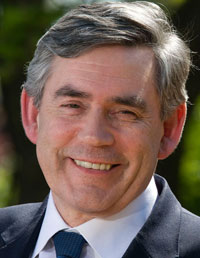- Real Truth Magazine Articles
- PROFILE
 Gordon Brown – British Prime Minister
Gordon Brown – British Prime Minister
Subscribe to the Real Truth for FREE news and analysis.
Subscribe NowTens of thousands are feared dead after a 7.0-magnitude earthquake rocked Haiti, reducing its capital, Port-au-Prince, to rubble. It was the worst of its kind to hit the impoverished island nation in 200 years.
Seventy-two hours after the quake, the stench of death lingered in the city. Decaying corpses littered the streets while bloodied survivors awaited aid from a limited number of medical personnel, who set up makeshift treatment centers along roadways.
With each passing day, food and water supplies have become more scarce and authorities fear that unsanitary conditions could lead to outbreaks of malaria and other diseases.
Aid has been hampered due to a limited number of airstrips near the capital. A photojournalist told Reuters that some disgruntled Haitians have set up roadblocks using corpses to protest the delayed response.
Inmates escaping nearby prisons, looting and gang fights have reportedly plagued the city, with some even scrambling past citizens attempting to rescue trapped loved ones in order to steal valuables from damaged buildings.
The earthquake compressed the two-story Presidential Palace into one floor, flattened a hospital, and crushed the United Nations Peacekeeping Headquarters, making any UN response nearly impossible.
Following the quake, wailing residents filled the streets, lifting debris-covered bodies and collecting broken belongings strewn about by the violent shaking and more than 30 aftershocks—some which registered at 5.8 and 5.9 on the Richter scale. The massive quake’s epicenter was just 10 miles west of the capital city.
By nightfall, a gray dust cloud settled over the city.
Citizens frantically worked through the night pulling bloodied family members from underneath toppled structures, as rescue aid was limited.
State Department spokesman P.J. Crowley told The Associated Press that U.S. embassy personnel in Haiti were “literally in the dark” after power failed.
“They reported structures down. They reported a lot of walls down. They did see a number of bodies in the street and on the sidewalk that had been hit by debris. So clearly, there’s going to be serious loss of life in this,” he said (ibid.).
The quake was felt in the Dominican Republic and in Cuba, but minimal damage was reported.
A number of nations, including the United Kingdom, United States and Venezuela, have already offered aid to the nation.
British Prime Minister Gordon Brown said in a public statement that he was “deeply saddened” and sent “a message of sympathy and support” to Haitian President Réne Préval. He continued, “We stand ready to provide whatever humanitarian assistance is required.”
In a White House-issued statement, President Barack Obama said, “My thoughts and prayers go out to those who have been affected by this earthquake. We are closely monitoring the situation and we stand ready to assist the people of Haiti.”
The earthquake is another blow to the poorest nation in the Americas, which has long been wracked with government instability, is often hit by hurricanes and other disasters, and relies nearly entirely on foreign aid.
Port-au-Prince Mayor Jean-Yves Jason estimated in November 2008 that 60 percent of the buildings in the city were unsafely built (AP).
“The metropolitan area is home to two million people in an area originally planned for 200,000. Houses are poorly constructed with lax codes, if any” (The Haitian Times).
Haitian-American author Edwidge Danticat, who lives in Miami, told The Associated Press that given Haiti’s condition as a country, it will be almost impossible for it to bounce back.
“Life is already so fragile in Haiti,” she said, “and to have this on such a massive scale, it’s unimaginable how the country will be able to recover from this” (ibid.).
 Gordon Brown – British Prime Minister
Gordon Brown – British Prime Minister